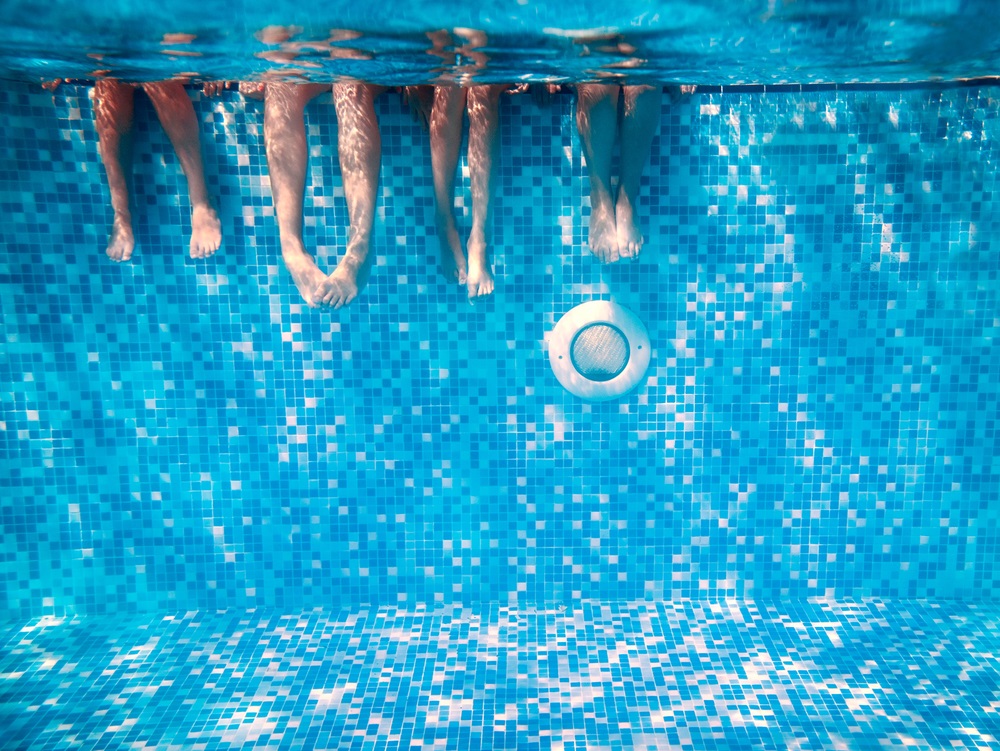You’re just not ready to say good bye to your swimming pool. What can you do, though when the water is so cold that your teeth are chattering no matter how fast you swim? Talk with your pool contractor about the benefits of installing a swimming pool heater. There are three basic types of pool heaters:
- Solar
- Gas
- Electric — heat pump models
Understanding the benefits and drawbacks of each type of heater will help you make an informed decision before you spend the money on the pool heater. However, if you want to swim for more months of the year, a pool heater is the way to go.
Heat Your Swimming Pool And Extend Your Swim Season
When you’re shopping for a pool heater you will hear the term, BTU (British Thermal Unit) bandied about and what you need to know is that for most pool heaters the BTUs range from 75,000 up to 450,000 — the higher the BTU the hotter the water.
Solar heaters. These draw power from the heat of the sun and the heater itself works by pumping wter from the pool into the filter where some of the water is diverted into the solar collectors, heated then sent back into the swimming pool. When looking at solar pool heaters you will be exposed to glazed and unglazed collectors. The glazed collector is made with copper tubing on aluminum plate; unglazed utilizes heavy dity rubber or plastic panels and an ultraviolet light inhibitor. The glazed collectors cost more, but are more durable than unglazed collectors.
A solar heating system can cost anywhere from $3,000 and higher to purchase and have installed. Your pool contractor can help you determine the correct size heater for your pool water size and depth. Keep in mind that a solar pool heater and its collection panels will take up a lot of backyard space so for its many benefits and low cost of operation, that will be a consideration for many pool owners.
A solar heater has many pros that include:
- Environmentally friendly
- The money you save in heating costs will pay for the installation and purchase
- They use a free source of energy — the sun
- They can last about 20 years
The drawbacks of a solar heater include:
- You need to have a lot of direct sunlight in order to heat the water.
- They are pricey (as are other models) up front
- They take up a lot of yard space and definitely do not add to the aesthetics of your landscaping

A gas pool heater can use either natural gas or propane to heat the water. To heat the water, it passes through a combustion chamber where the water is heated then returned to the pool. Basically the water passes through a burning hot tube then back into the pool. Whether you use natural gas or propane will depend on the availability in your area of the country. Natural gas and propane heaters are essentially the same price to purchase the equipment.
The cost for a gas heater is about $2,000 to $4,000 depending on the size and brand. It may cost you up to $500 per month in increased utility bills so make sure you budget for that.
The pros of a gas heater are:
- They are relatively inexpensive
- It heats the water quickly and doesn’t rely on ambient temperatures
The cons of a gas heater are:
- It uses gas
- It is costly to operate
- If there is no natural gas in your area you will have to have a propane tank installed and they are not usually attractive
- They are not environmentally friendly
Pool heat pumps warm the water using the ambient air. To heat the water with a heat pump there is a fan that draws in the heat from outside (ambient) air, directs it to an evaporator coil and heats the water before returning it to the pool. Heat pumps cost more than gas pool heaters up front, but are less expensive to operate over the long run. You can purchase a heat pump for between $2,000 and $3,500. If you want to keep your pool water at 80 degrees, you will pay about $1,500 in utility costs to heat the pool water.
The pros of a heat pump are:
- They are inexpensive to operate
- They can last for up to two decades
- They are environmentally friendly
- They are a viable option to solar heating
The cons of pool heat pumps include:
- You will have to run a 220V electrical outlet
- They don’t operate efficiently in cold temperatures
- They are slow to heat the water
Do your homework and ask us for help in sizing a heater for your pool water. It may make sense for your family to have access to your pool for more months of the year — after all, it’s great fun to swim together!

